House gives initial OK to ban some gender-affirming care for minors; nears becoming law
- Oops!Something went wrong.Please try again later.
- Oops!Something went wrong.Please try again later.
Despite efforts by House Democrats to stop a bill that would ban certain gender-affirming medical treatments for transgender children, the proposal cleared a major hurdle in the Texas House on Friday, nearing the final steps to become law.
Republicans had tried to bring Senate Bill 14 up for a vote on the House floor twice last week, but Democrats both times managed to successfully use a procedural tactic called a “point of order” to identify minor errors in the legislation that violated the House rules, delaying debate on the bill for more than a week.
After fixing mistakes in the bill twice, Republicans on Friday brought SB 14 to the House floor a third time, and, despite an emotional, tense debate and several attempts by Democrats to kill or amend the legislation, the House voted to pass the bill 92-48.
Eleven Democrats and one Republican appeared to cross party lines in their vote, though Democratic Reps. Jessica Gonzalez and Christian Manuel confirmed to The Dallas Morning News that their votes for the bill were a mistake or a malfunction with their voting machines, and they would be changing their votes to against the bill. Republican Rep. Charlie Geren, the sole Republican to vote against the bill, also confirmed to the Morning News that he mistakenly voted against the bill and would be changing his vote to support it. The remaining nine Democrats who voted for the bill have not clarified whether their votes were intentional or not.
The bill needs one more vote, which is often largely a formality, in the House before returning to the Senate for a review of any changes. If the upper chamber signs off on the revisions, it will head to the governor’s desk to be signed into law. The last day of the 88th legislative session is May 29.
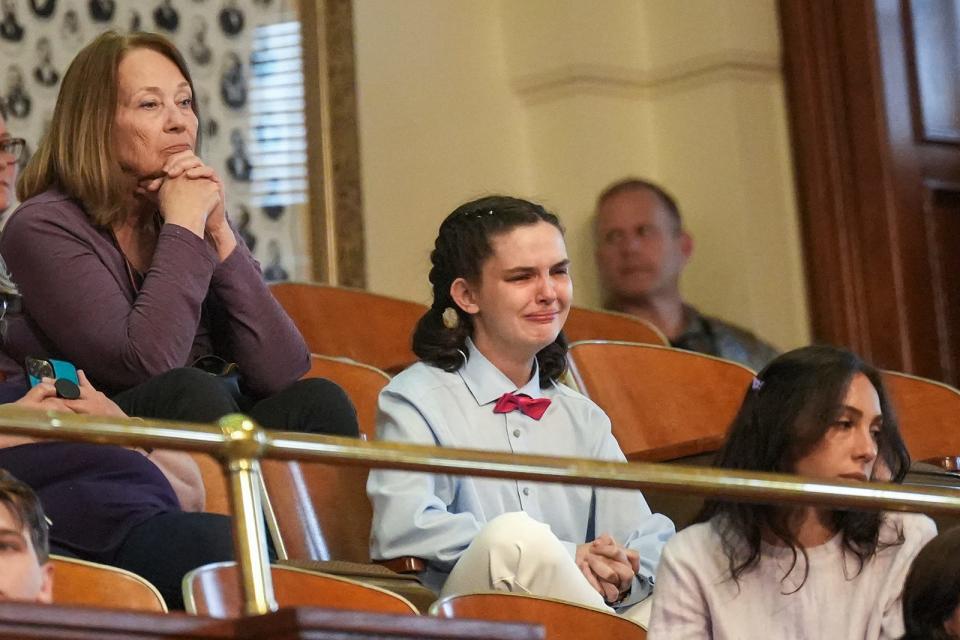
SB 14, which has already been approved by the Senate, would prohibit doctors from providing gender-affirming medical treatments — including puberty blockers, hormone therapy or certain surgeries — to minors experiencing gender dysphoria, a condition in which one’s gender identity does not align with their sex at birth. It also would ban any public funds from going to physicians, hospitals or any other entities that provide such treatments, and it would revoke the medical licenses of any medical professionals who provide that care.
The bill would not apply to children who are intersex — biologically between the medical definitions of male and female — or who need such medication to treat premature puberty.
Major medical associations — including the American Academy of Pediatrics, the American Medical Association and the American Psychiatric Association — support the provision of developmentally appropriate and individualized gender-affirming medical care for transgender youth, saying it can be lifesaving and medically necessary. However, Republicans and other supporters of the bill say minors should be kept from making decisions about their medical care that could have long-term impacts or side effects.
More: Texas Senate passes ban on transgender care for minors, without current patient exemption
While the bill was previously amended in the Senate to allow patients who are receiving puberty blockers or hormone therapy by June 1 to be exempted from the ban, the bill’s author later reversed course and removed the amendment before the bill was passed out of that chamber. When the House took up the measure, its Public Health Committee amended the bill to allow, and require, patients who are on puberty blockers or hormone treatments by June 1 to be weaned off their medications in a safe and medically appropriate period of time. The provision only applies to patients who attended 12 or more therapy sessions at least six months before beginning medical treatment.
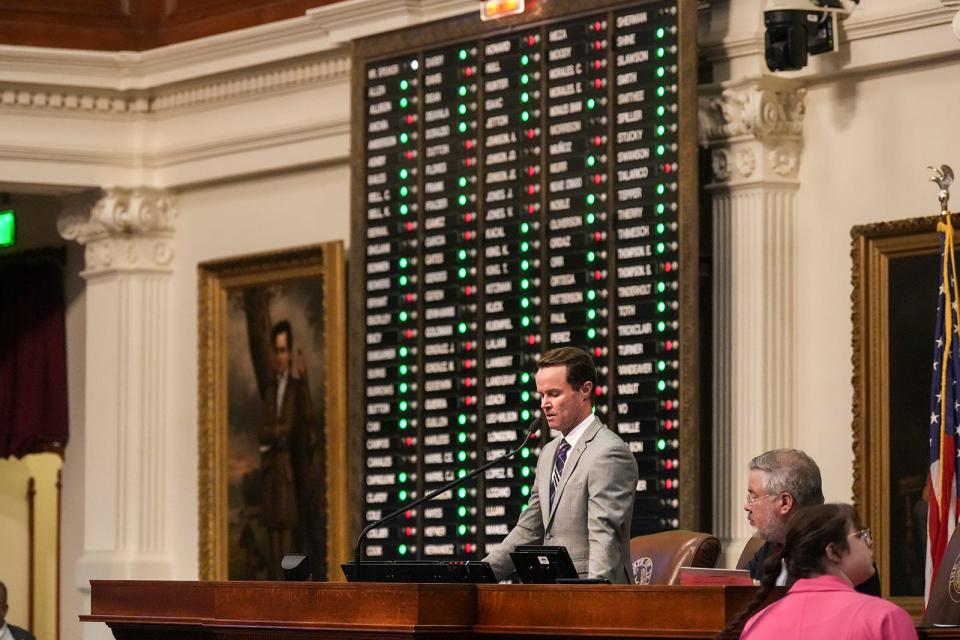
Gender-affirming care ban debate stretches nearly six hours
Before lawmakers even began a debate over the treatment ban that would stretch for nearly six hours, Democrats raised two points of order to try to again delay debate on SB 14. But after both attempts failed, Democrats switched tactics and offered 18 amendments to soften the bill's restrictions, ranging from striking the bill’s enacting language — which would kill the legislation — to limiting the bill's scope to only apply to surgeries and allowing medical professionals to provide puberty blockers and hormone therapy.
All the Democrats’ amendments were voted down by Republicans.
In laying out the legislation, Rep. Tom Oliverson, R-Cypress, who authored the House equivalent of SB 14, argued that the bill is necessary to prevent children from being harmed.
"Let me begin by saying there is no high-quality scientific evidence (that) puberty blockers, cross sex hormone therapy, or surgery helps children overcome gender dysphoria," Oliverson said. "Children are being harmed as a result of this failure to practice good medicine. … Gender dysphoria is a mental health disorder, not a physical one."
Oliverson, however, defended the bill's provision that would allow medical providers to use puberty blockers to treat children experiencing premature puberty.
"There are situations where these medications are used in an attempt to restore normal human development, and that is exactly the opposite of what this bill bans,” Oliverson said.
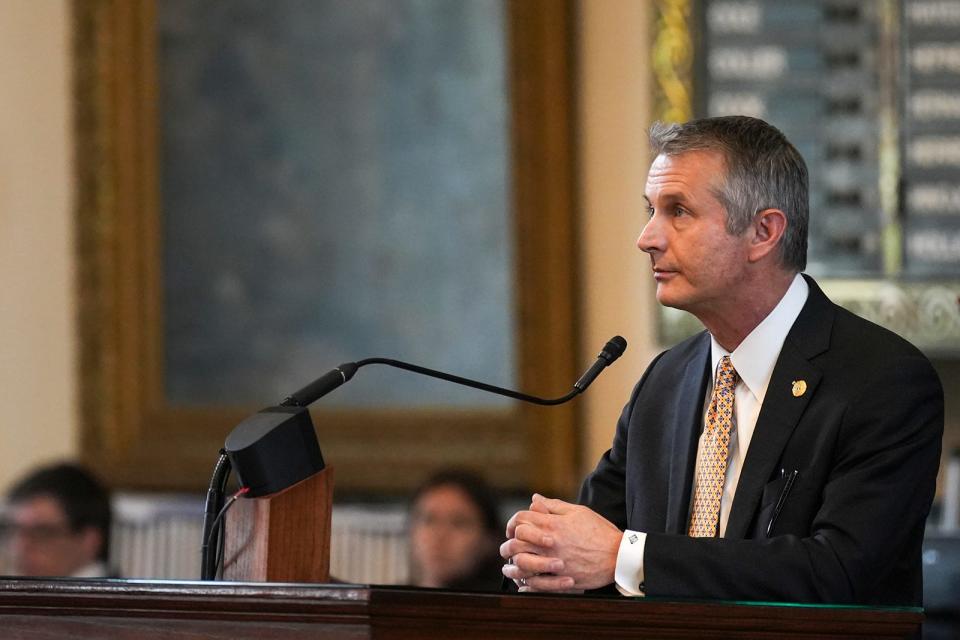
In opposing the bill, Rep. Mary Gonzalez, D-Clint, argued that the carveout to allow these medications to treat conditions other than gender dysphoria is explicitly discriminatory against transgender kids.
“It is important to note this health care, these prescriptions that we're talking about, are still available to children with other medical conditions," Gonzalez said. This bill is banning "health care for one group of people, and we have to ask ourselves why?"
Other Democrats, including Rep. Julie Johnson, D-Farmers Branch, peppered Oliverson with questions, and argued the bill would block access to medical care that could be lifesaving for transgender kids.
"You have frequently advocated for parents to have the right to make important decisions for their children,” Johnson said. “In this particular context, you are absolutely prohibiting parents of transgender kids from making medical decisions that they feel are necessary for their children."
Gonzalez also pointed to the negative mental health outcomes that even having a debate on banning medications for LGBTQ+ youth could have on those Texans.
"The precedent of banning the medically accepted practice of the standard of care is extremely dangerous, because in any other circumstance, we would never do that," she said.
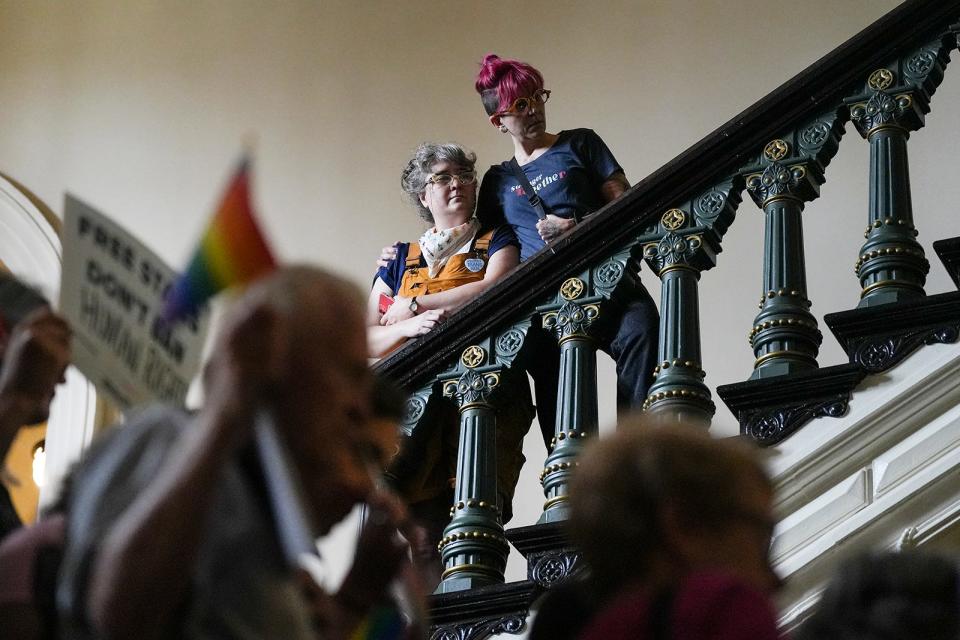
LGBTQ+ rights activists rally ahead of SB 14 vote
Ahead of the Friday vote, a large crowd of LGBTQ+ rights activists filled the stairs and hallway in front of the House chamber to rally against SB 14. Democratic lawmakers read letters from parents of transgender children and from transgender kids, who wrote about the impact SB 14 would have on their families and the toll the debate over access to gender-affirming care has already had on the kids.
Rep. Trey Martinez Fischer, D-San Antonio, read a letter from a parent of a transgender kid in Texas.
“Our lives are pretty unremarkable for the most part, but according to the state of Texas, our family is so different from others that we deserve to be targeted by legislation that would harm us,” Martinez Fischer read aloud. “My transgender son, who, for most of his young life, didn't have a care in the world other than wondering if the Astros were going to win the World Series, has been waking up every other night from nightmares. Nightmares where he's taken away from his siblings and parents, ripped from his bed and forced to live with strangers who tell him that he isn't who he himself is to be.”
Another letter from a family of a transgender child explained that they moved out of Texas due to fear for their child’s health and safety and fear of investigations by the state Department of Family and Protective Services, which was directed by the governor last year to open child abuse investigations against families who receive certain gender-affirming care for their children.
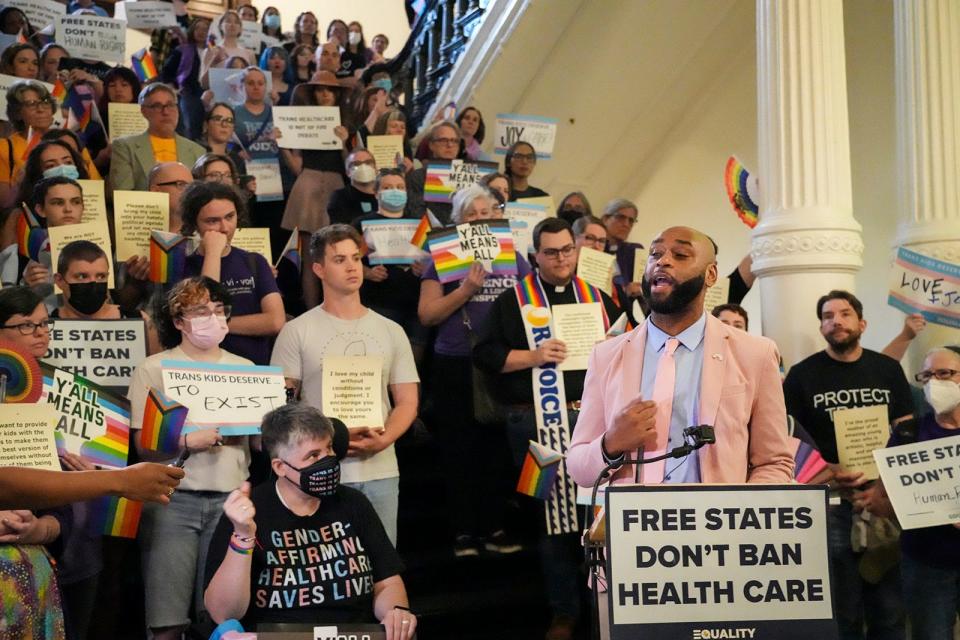
Rep. Christian Manuel, D-Beaumont, who is openly gay, read a letter by a parent who said their transgender daughter has been experiencing panic attacks out of fear of the investigations and legislation.
“She said she was trying to fall asleep but couldn't because she was afraid she would wake up somewhere else, that she'd wake up having been taken away from her family,” Manuel read. “It didn't take much questioning to find out that she had seen stories on the news about what is happening in the Texas Legislature and bills targeting kids like her.”
Rep. Erin Zwiener, D-Driftwood, read a letter written by an 8-year-old transgender child living in Texas.
“I like to dance and sing. I do lots of crafts. My mom doesn't like the glitter, but she loves what I make. I love my school,” Zwiener read from the letter. “I like to go to rallies and protests because I know what is going on in Texas is wrong. But I would prefer to be at home playing with my friends. It makes me sad that some just don't want to learn about people like me. We did a musical program at school where we had to sing all the songs about Texas ... but singing ‘Texas, Our Texas’ was hard when so many people act like it's ‘Texas, Your Texas.’ I am just a normal kid.”
Landon Richie, an LGBTQ+ rights activist and trans Texan, also addressed the crowd.
“I am here as a young trans adult, as a college student, because I had access to lifesaving, life-giving care as a trans youth,” Richie said. “To be trans in Texas is to be human in the place that we call home. Trans people in Texas are loved, are divine, are beautiful and are necessary. Trans people in Texas deserve to grow up and to grow old.
"We are here today, and I've been here all session, because we know who we are and we know what we deserve. We're here today because we love ourselves and we love each other. We will never stop fighting for a Texas that loves us back.”
This article originally appeared on Austin American-Statesman: Texas Legislature: House OKs banning gender-affirming care for minors

